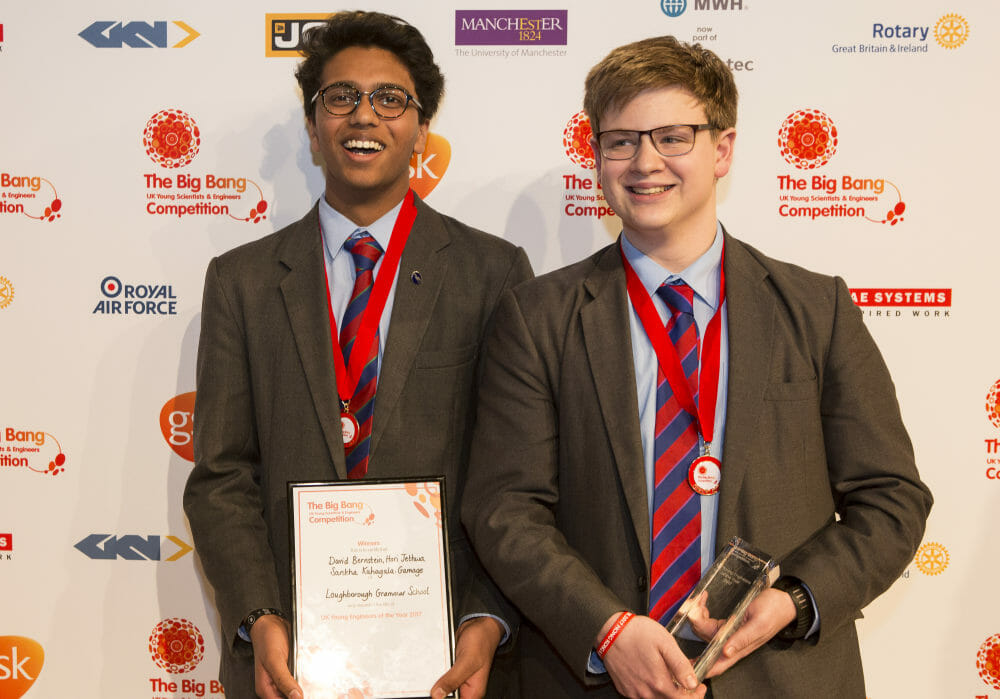Sankha Kahagala-Gamage (16) and David Bernstein (16) took the top prizes in The Big Bang UK Young Scientists and Engineers Competition.
After witnessing an epileptic fit, Sankha teamed up with David to create a wearable vest that monitors heart rate variability and body temperature to efficiently predict an epileptic fit up to eight minutes in advance.
Once a fit is detected, the vest sends a message to both the wearer’s phone as well as possibly a carer to warn them that they need to seek help.
Winner of the UK Young Engineer of the Year 2017 title, Sankha, said:
“Winning was one of the greatest achievements of our lives. It just goes to show if you truly believe in your invention and you put enough work in, you will succeed. I hope the MediVest will inspire the next set of engineers in 2018.”
Winner of the UK Young Engineer of the Year 2017 title, David, said:
“The Big Bang Fair has been an absolute manic couple of days for us – but I’ve loved every second of it! It’s an opportunity to learn about the most amazing sciences and engineering and I’m humbled to be around such amazing minds working to create the newest science and technology.”
Over 600 finalists from across the country were selected to show their ideas at The Big Bang Fair where ten were then shortlisted to pitch Dragon’s Den-style to a panel of high profile judges, including Dr Maggie Aderin-Pocock, MBE Space scientist & TV presenter, Jason Bradbury, TV presenter & gadget guru and Dr Shini Somara, Mechanical Engineer & TV presenter.
The Big Bang Competition is an annual contest designed to recognise and reward young people’s achievements in all areas of science, technology, engineering and maths (STEM), as well as helping them build skills and confidence in project-based work.
Previous winners include young people who have since gone on to successful careers in a range of high profile companies, represent the UK at international awards and even become the youngest ever entrepreneurs to appear on BBC’s Dragon’s Den.
Congratulating the winners, Paul Jackson, Chief Executive of EngineeringUK, which organises The Big Bang Competition said:
“The winners have been rightly recognised as some of the brightest young talent in the country. Their innovative thinking and fresh ideas stood out to the judges. They are not just prize winners, but a real inspirational. I hope their success will encourage young people across the country to enter The Competition either online or at a regional Big Bang Fair.
“It’s easy to see why these ideas stood out to the judges but all the finalists are worthy of mention – not only for their exciting new ideas but for showcasing them to crowds of people at The Fair. This glimpse into the minds of the scientists and inventors of tomorrow promises great things for the future.”
Chantal Spittles, of Epilepsy Action, said:
“Sankha and David have done a fantastic job with their project. Not only have they put their technical skills to good use, but it’s wonderful to see how they were compelled to do something positive after they saw someone have a seizure. It’s sadly all too common for people with epilepsy to be ignored or even discriminated against because of their condition. It doesn’t have to be this way, and Sankha and David’s maturity and attitude are an inspiration to us all.
“Epilepsy is a wide-ranging condition, which affects people in ways that are unique to them. We know that one of the most challenging things about epilepsy is the unpredictable nature of the condition and never knowing when a seizure is going to happen. This kind of technology could therefore be useful in giving people warning of seizures so they can make themselves safe or send for help. We welcome research into wearable technology which could help to predict when seizures might occur and will be interested to see how things develop in the future.”






